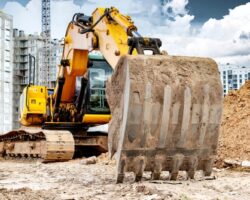The Benefits of Renting Heavy Equipment for Construction Projects
 The Benefits of Renting Heavy Equipment for Construction Projects
The Benefits of Renting Heavy Equipment for Construction Projects
In the world of construction, heavy equipment is an absolute necessity. From excavators to bulldozers, these machines can make projects easier, safer and more efficient. However, for many construction companies, owning and maintaining this equipment is simply not feasible. That’s where renting comes in as a great solution. Here are some top benefits of renting heavy equipment for your construction projects.
Cost-Effective
The cost of purchasing heavy equipment can be a huge burden for small or medium-sized companies. When you consider the high maintenance costs and storage requirements of owning your own equipment, renting becomes a more cost-effective solution. In addition, renting equipment allows you to have access to a range of different pieces of equipment within your budget. You can get the right tool for the job without having to break the bank. This is especially helpful since different jobs require different equipment to be available.
Reduced Maintenance
Heavy equipment involves a lot of maintenance, repair, and upkeep. Owning your own equipment means having to take on a great deal of responsibility – from experienced technicians in house to handling warranties and insurance policies. With a rental, however, you don’t have to deal with any of that. The rental company handles the maintenance and service of the equipment, ensuring that it is always in working order. This means you won’t have to spend additional time and resources to maintain and repair equipment that is not being used all the time.
Access to Wide Range of Equipment
Construction equipment needs vary based on the job at hand. This means that you may need to use different machines for different projects. A equipment rental company offers access to a wide range of modern and efficient equipment that you can use for any job. This includes new models with the latest features and technology, like GPS control systems. Even better, you can select the exact equipment you need for your project, so you won’t end up with something that isn’t right for the job.
Avoiding Depreciation
Equipment is an asset to any construction project, but like all assets, it depreciates over time. This means that even if you own the equipment, its value will decrease over time. Additionally, if there are newer models with better features and technology, owning older models can actually delay projects when machines break down or aren’t as efficient. By renting the equipment you need, you avoid the issue of depreciation. All you need is the machinery that you require to complete your project, with the ability to upgrade when necessary.
Seasonal Needs
There may be times when you only need a particular piece of heavy equipment for a short period, for example, during a specific season or for a one-time job. In this case, it might not make sense for your company to purchase the machine outright, considering the maintenance and storage costs associated with ownership. In these cases, renting makes a lot more sense, as it allows you to use machinery when you need it without the ongoing costs associated with owning it.
Reduced Storage Requirements
Heavy construction equipment requires a lot of storage space when it is not in use. Depending on the size of your company, you may not have enough space to store it on site, which means you have to rent additional storage space or pay for offsite storage. This can be a significant expense. With rental equipment, you don’t have to worry about storage solutions. The rental company delivers the equipment directly to your construction site, removes it when you’re done, and stores it on their own premises in between rentals.
Reduce Long-Term Risk
It is easy to underestimate the costs associated with owning and maintaining heavy equipment. Unexpected repair costs, depreciation costs, insurance, and storage costs all begin to add up. By renting, your business can take on a shorter-term commitment, without having to assume the long-term risks associated with equipment ownership. This way you only need the equipment for as long as required, and can easily make adjustments to your equipment needs when your needs change.
Conclusion
Opting to rent heavy construction equipment has various benefits, including cost savings, access to the latest models, avoiding depreciation, avoiding ongoing maintenance and storage costs, and flexibility in equipment selection. You will want to consider these advantages and at least evaluate some heavy equipment rental companies to increase your bottom line.
